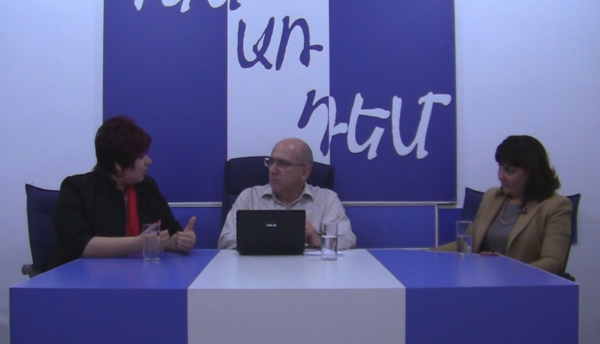The theme of “Aravot” online on the air is discussed by Armine Ohanyan, the editor of “Hraparak” newspaper, and Astghik Avetisyan, the founder of Anews.am website, also Associate Professor of YSU Radio and Television Journalists Department.
Aram Abrahamyan – Life is richer than politics: culture, law, economy… but when you begin talking to journalists or editors, they are talking about politics. Why?
Armine Ohanyan – It seems to me that our readers first and foremost are the politicians. During these years, I am constantly trying to expand the scope of this circle, to satisfy the interests of other people as much as possible, I do not know how I am successful in it. Unfortunately, sociological polls and public opinion surveys, and studies to determine the scope of our readers are not held in our country, in other words, we learn of opinions more through the telephone calls, visits to the people and the Facebook comments.
A. A. – When I became an editor 20 years ago, we decided to write less about politics, festivals, concerts and so on, but it appears that it is not read; the sports, sex and scandals are read, which are not to many in Armenia because we are a small country, and the policies.
Astghik Avetisyan – In fact, when the media was formed 20 years ago, there were very few opportunities, and there were difficult years, so maintaining a newspaper and having a print paper gives a great opportunity. But, also, the resources were very limited to attract. I would like to state that you were able to set up a newspaper and were able to preserve it up to now. Today, we have very few newspapers the Armenian media, which you take it, read it and can understand what is actually going on.
A. A. – You were writing materials in “Armenian Times” on legal themes, and now it seems that legal themes are not read in the media, trials, etc.
A. O. – I would not say. Of course, there are many ordinary people, who have dealt with court illegalities, with different officials and bureaucrats. They apply to the editorial staff, and it is very hard to refuse them. As a rule, they say, it’s better to write a little about one citizen, and it would find a respond than to make hundreds of political publications, which we fill in one place and it gives no result.
Astghik A. – You are right, somehow the feature of an ordinary person has left out of the mass media, and now, we need to little by little bring this feature back and begin introducing this person in domestic and everyday life, because when we look at our media field, everything looks very colorful to us, but actually we also have the opposite – the black sides, and we should have it, too.
A. O. – But there are also purely business interests. Newspaper is also a business. It should have a reader, which is few or the reader is not interested in the problems of the ordinary people, and slowly-slowly, the topic is moved to the back plan.
A. A. – People come to the editorial house, write a letter to Serzh Sargsyan and Hovik Abrahamyan, cc to Armine Ohanyan, etc., in other words, they think that we can help them as much as these government officials. Are these expectations legal?
Astghik A. – I think, yes, because no matter we say that the chorrord ishkhanutyun has lost its role, however, mass media remains the most stable and strongest in formation of a public opinion. If this ordinary citizen learns how to raise problems, definitely help comes from somewhere, many people are silent, many people do not know the methods, do not know the manners of how to do if the person has no other choice, so he has to come up with an open letter. There is one more thing, too, many people act anonymously, and in this case, a problem arises for many media whether to publish or not.
The discussion in full
Prepared by ARAM ABRAHAMYAN
“Face to Face” talk show series are released by the Open Society Foundations- Armenia. The views and analyzes found in this broadcast express the opinions of the participants, and are not approved by the Open Society Foundations-Armenia, or its Board. This broadcast is made available thanks to comprehensive financial support by the Open Society Foundations-Armenia, under the mass media support program, grant No 18624.






















































